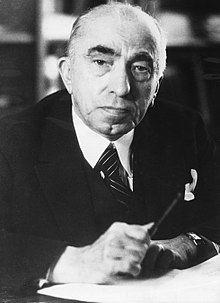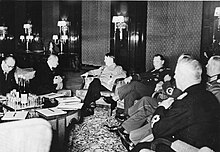Emil Hacha
Emil Hácha (born July 12, 1872 in Trhové Sviny ; † June 27, 1945 in Prague ) was a Czech lawyer , politician and elected President of the Czecho-Slovak Republic / "Second Republic" (1938-1939). With the establishment of the Protectorate of Bohemia and Moravia on March 15, 1939, he was appointed head of the formally autonomous administration of this area of the Greater German Reich . Hácha served as the so-called state president until the end of the Second World War in 1945.
Life
Hachá completed his law studies at the Charles University in Prague and graduated in 1896 with a doctorate. He then worked as a lawyer for the Bohemian State Committee.
Shortly after the beginning of the First World War , he became a member of the Council of the Austrian Administrative Court , from 1918 he was a member and from 1925–1938 President of the Supreme Administrative Court of Czechoslovakia . After the Munich Agreement and the subsequent resignation of Edvard Beneš , Hácha was elected third President of Czechoslovakia on November 30, 1938 by the National Assembly (with 273 votes and 39 abstentions) and the Senate.
After the declaration of independence of Slovakia , he was on 14 March 1939, negotiations with Adolf Hitler to Berlin ordered from this and Hermann Goering u. a. under threat of bombing Czech cities under such massive pressure ("háchaisiert", as Hitler later called such a treatment) that he agreed to the occupation of his country by German troops in the early morning of March 15th. After the Munich Agreement, in which Czechoslovakia had to cede the predominantly German-populated Sudetenland to the German Reich , further territorial losses to Hungary ( Upper Hungary ) and Poland ( Olsa area ), the secession of Slovakia and the German invasion, the remaining area of Czechoslovakia ( " Rest of Czech Republic ") declared a " Protectorate of Bohemia and Moravia " on March 16, 1939 . Hácha now acted as the "head of the autonomous administration", which was actually subordinate to the German Reich Protector in Bohemia and Moravia .
Initially, Hácha was also in contact with the government in exile under Edvard Beneš . From 1941 he was increasingly isolated and put under pressure by the occupying forces . As a result of his steadily deteriorating health (he suffered from arteriosclerosis ) he was hardly able to exercise his office from 1943 on, but was still needed and used as a symbol by the German occupying forces. After the Wehrmacht withdrew and the re-established Czechoslovakia was occupied by the Red Army in 1945, he was taken into custody on May 13, 1945 in Lány Castle . He died a few weeks later in the hospital of Pankrác Prison under not entirely clear circumstances .
He is buried in the Vinohrady Cemetery in Prague.
Individual evidence
- ^ The aftermath of Munich. October 1938 - March 1939 (= files on German foreign policy. 1918–1945. Series D: 1937–1945. Vol. 4, ZDB -ID 400668-9 ). Vandenhoeck & Ruprecht et al., Göttingen et al. 1951, p. 235.
- ↑ Miroslav Kárný : Protectorate of Bohemia and Moravia. In: Wolfgang Benz , Hermann Graml , Hermann Weiß (eds.): Encyclopedia of National Socialism . 3rd, corrected edition. Klett-Cotta, Stuttgart 1998, ISBN 3-608-91805-1 , p. 656 .
- ^ Jörg K. Hoensch : History of Bohemia. From the Slavic conquest to the present. 3rd, updated and supplemented edition. CH Beck, Munich 1997, ISBN 3-406-41694-2 , p. 434 : “The autonomous self-administration granted to the Protectorate with a president and its own government was so narrowly restricted by Hitler from the beginning that in practice it soon became absolute The authority of the Reich Protector and his administration, which was subordinate to the unscrupulous, ambitious KH Frank , resulted. "
literature
- Emil Hacha , in: Internationales Biographisches Archiv 17/1947 from April 14, 1947, in the Munzinger archive ( beginning of article freely available)
Web links
- Literature by and about Emil Hácha in the catalog of the German National Library
- Newspaper article about Emil Hácha in the 20th century press kit of the ZBW - Leibniz Information Center for Economics .
| personal data | |
|---|---|
| SURNAME | Hácha, Emil |
| BRIEF DESCRIPTION | Czech politician and President of the Protectorate of Bohemia and Moravia |
| DATE OF BIRTH | July 12, 1872 |
| PLACE OF BIRTH | Trhové Sviny |
| DATE OF DEATH | June 27, 1945 |
| Place of death | Prague |



